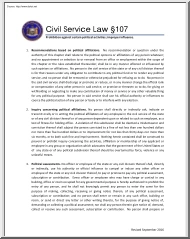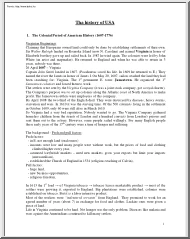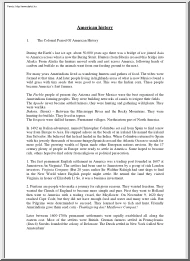Please log in to read this in our online viewer!

Please log in to read this in our online viewer!
No comments yet. You can be the first!
What did others read after this?
Content extract
Aswath Damodaran THE ESG MOVEMENT: THE GOODNESS GRAVY TRAIN ROLLS ON! Charity begins at home Buzz Words and Magic Bullets! In my four decades in corporate finance and valuation, I have seen many "new and revolutionary" ideas emerge, marketed as the solution to all of the problems in business decision making. ¨ Most of the time, these ideas represent either a repackaging of existing concepts, with a healthy dose of marketing and selling, usually by consultants and bankers, and their magic fades quickly once their limitations come to the surface, as they inevitably do. ¨ The latest entrant in this game is ESG (Environmental, Social and Governance), and the sales pitch is wider and deeper. Companies that improve their social goodness standing will not only become more profitable and valuable over time, we are told, but they will also advance society's best interests, thus resolving one of the fundamental conflicts of private enterprise, while also enriching
investors. ¨ 2 Why now? 50 years since Friedman: The first is that it is the fiftieth anniversary of one of the most influential opinion pieces in media history, where Milton Friedman argued that the focus of a company should be profitability, not social good. ¨ COVID and ESG: The second were multiple news stories about how "good" companies have done better during the COVID crisis and how much money was flowing into ESG funds. ¨ The Establishment has bought in: The third is a more longstanding story line, where the establishment seems to have bought into ESG consciousness, with business leaders in the Conference Board signing on to a "stakeholder interest" statement last year and institutional investors shifting more money into ESG funds. ¨ 3 The Four Big Questions What is ESG and can it be measured? 1. ¤ ¤ Implicit in the ESG movement is the assumption that there is collective consensus on what comprises good, and that it can be measured. But is
there? How (if at all) does ESG affect value? 2. ESG is being marketed to companies as being value increasing. ¤ The marketing pitch is based upon anecdotal evidence (usually from fossil fuel/mining companies) and studies that are more advocacy than serious research. ¤ As an investor, can (will) you make money investing based on ESG? 3. ¤ Investment funds are pushing ESG to the forefront, with the pitch that investors in “good” companies will earn higher returns. Is society better off, if companies follow the ESG path? 4. If all of the above fail to convince you, the fall back is that since it is good for society, why does it matter? ¤ But is it? ¤ 4 1. Goodness is difficult to measure, and the task will not get easier. The starting point for the ESG argument is the premise that we can come up with measures of goodness that can then be targeted by corporate managers and used by investors. To meet this demand, services have popped up around the world, claiming to
measure ESG with scores and ratings. ¨ As I noted in my last post, there seems to be little consensus across services on how to measure goodness, and the low correlation across service measures of ESG has been well chronicled. ¨ The counter from the ESG services and ESG advocates is that these differences reflect growing pains, and just as bond ratings agencies found convergence on measuring default risk, services will also find commonalities. I think that view misses a key difference between default risk and goodness, insofar as default is an observable event and services were able to learn from corporate defaults and fine tune their ratings. ¨ Aswath Damodaran 5 Different value systems Aswath Damodaran 6 ESG Scores and Company Size Aswath Damodaran 7 ESG Scores and Disclosure Bulk Aswath Damodaran 8 And if your argument is that it measures risk, not goodness Aswath Damodaran 9 2. Being good will help some firms, hurt others and do others unaffected!
Aswath Damodaran 10 Is ESG good for companies? ¨ The notion that ESG is good for companies is being sold strongly, with research that is Anecdotal, in the form of case studies ¤ From advocates, with strong priors that ESG matters ¤ Statistically a mess, because it is so difficult to tell the direction of causation ¤ ¨ The truth is much grayer and predates the entire ESG movement, and is that Companies that are “bad” or perceived to be so, because they have crossed a good corporate citizen line are exposed to punishment. That punishment, right now, is coming from investors and lenders more than from customers and employees. ¤ There are some companies that benefit from being “good”, but they have trouble scaling up ¤ For other companies, ESG is just a marketing tactic, which loses (or already has lost) its effectiveness, as everyone uses it. ¤ Aswath Damodaran 11 3. The ESG sales pitch is internally inconsistent and fundamentally incoherent Aswath Damodaran
12 Implications for investing ¨ ¨ The first is that it suggests that much of the research on the relationship between ESG and returns yields murky findings. Put simply, there is very little that we learn from these studies, whether they find positive or negative relationships between ESG and investor returns, since that relationship is compatible with a number of competing hypotheses about ESG, value and price. The second is that bringing in market pricing does shed some light on perhaps the only aspect of ESG investing that seems to deliver a payoff for investors, which is investing ahead or during market transitions. ¤ ¤ ¨ I pointed to this study that find that activist investors who take stakes in "bad" companies and try to get them to change their ways generate significant excess returns from doing so. Another study contends that investing in companies that improve their ESG can generate excess returns of about 3% a year, but skepticism is in order because
it is based upon a proprietary ESG improvement score (REIS), and was generated by an asset management firm that invests based upon that score. If you are interested in making market transitions on ESG work in your favor, you also have to be clear about the strengths you will need to get the payoffs, including skills in divining not only what social values are gaining and losing ground and which changes have staying power. Aswath Damodaran 13 4. Outsourcing your conscience is a salve, not a solution! ¨ ¨ ¨ The ESG movement has given each of us an easy way out of having to make choices, by outsourcing these choices to corporate CEOs and investment fund managers, asking them to be “good” for us, while not charging us more for their products and services and delivering above-average returns . Implicit in the ESG push is the presumption that unless companies that are explicitly committed to ESG, they cannot contribute to society, but that is not true. Consider Bill Gates
and Warren Buffett, two men who built extraordinarily valuable companies, with goodness a factor in decision making only if it was good for business. Both men have not only made giving pledges, promising to give away most of their wealth to their favorite causes in their lifetimes, and living up to that promise, but they have also made their shareholders wealthy, and many of them give money back to society. As I see it, the difference between this “old” model of business and the proposed “new ESG” version is in who does the giving to society, with corporate CEOs and management taking over that responsibility from shareholders. I am not willing to concede, without challenge, that a corporate CEO knows my value system better than I do, as a shareholder, and is better positioned to make judgments on how much to give back to society, and to whom, than I am. Aswath Damodaran 14 An inside perspective ¨ For a perspective more informed and eloquent than mine, I would strongly
recommend this piece by Tariq Fancy, whose stint at BlackRock, as chief investment officer for sustainable investing, put him at the heart of the ESG investing movement. He argues that trusting companies and investment fund managers to make the right judgments for society will fail, because their views (and actions) will be driven by profits, for companies, and investment returns, for fund managers. ¤ He also believes that governments and regulators have been derelict in writing rules and laws, allowing companies to step into the void. ¤ ¨ While I don’t share Tariq’s faith that government actions are the solution, I share his view that entities whose prime reasons for existence are to generate profits for shareholders (companies) or returns for investors (investment funds) all ill suited to be custodians of public good. Aswath Damodaran 15 Cui Bono? (Who benefits?) Aswath Damodaran 16 Fake ESG? BlackRock’s Carbon Transition ETF Expenses: 0.03% Expenses: 0.15%
17 And why it keeps on rolling. ¨ ¨ ¨ Given that shareholders in companies and investors in funds are paying for this gravy, you may wonder why corporate CEOs not only go along with this charade, but also actively encourage it, and the answer lies in the power it gives them to bypass shareholders and to evade accountability. After all, these are the same CEOs who, in 2019, put forth the fanciful, but great sounding, argument that it is a company’s responsibility to maximize stakeholder wealth, rather than cater to shareholders, which I argued in a post then that being accountable to everyone effectively meant that CEOs were accountable to no one. In some cases, flaunting goodness has become a way that founders and CEOs use to cover business model weaknesses and overreach. It is a point that I made in my posts on Theranos, at the time of its implosion in October 2015, and on WeWork, during its IPO debacle in 2019, noting that Elizabeth Holmes and Adam Neumann used their
“noble purpose” credentials to cover up fraud and narcissism. Aswath Damodaran 18 A Roadmap for being and doing good 1. 2. 3. 4. Start with a personalized measure of goodness, and don’t overreach: The key with moral codes is that they are personal, and for goodness to be incorporated into your investment and business decisions, you have to bring in your value judgments, rather than leave it to ESG measurement services or to portfolio managers. As a business person, be clear on how being good will affect business models and value: If you own a business, bring your personal views on morality into your business decisions, but if you do so, you should be at peace with the fact that staying true to your values may, and probably will, cost you money. If you are making decisions at a publicly traded company, as an employee, manager or even CEO, you are investing other people’s money and if you choose to make decisions based upon your personalized moral code, you have an
obligation to be open about what your conscience will cost your shareholders. As an investor, understand how much goodness has been priced in: If you are an investor, you don’t have to compromise on your values, as long as you realize, at least in the long term, you will have to accept lower returns than you would have earned without that constraint. As a consumer and citizen, make choices that are consistent with your moral code: Your consumption decisions (on which products and services you buy) and your citizenship decisions (on voting and community participation) have as big, if not greater, an effect. Aswath Damodaran 19 In conclusion. ¨ ¨ ¨ On a personal note, I have always found that the people that I've known who do good, spend very little time talking about being good or lecturing other people on goodness. I would extend that perspective to companies and investment funds as well, and I reserve my skepticism for those companies that spend hundreds of pages of
their annual filings telling me how much "good" they do. The ESG movement’s biggest disservice is the sense that it has given those who are torn between morality and money, that they can have it all. Telling companies that being good will always make them more valuable, investors that they can add morality constraints to their investments and earn higher returns at the same time, and young job seekers that they can be paid like bankers, while doing peace corps work, is delusional. In the long term, as the truth emerges, it will breed cynicism in everyone involved, and if you care about the social good, it will do more damage than good. The truth is that, most of the time, being good will cost you and/or inconvenience you (as businesses, investors or employees), and that you choose to be good, in spite of that concern. Aswath Damodaran 20
investors. ¨ 2 Why now? 50 years since Friedman: The first is that it is the fiftieth anniversary of one of the most influential opinion pieces in media history, where Milton Friedman argued that the focus of a company should be profitability, not social good. ¨ COVID and ESG: The second were multiple news stories about how "good" companies have done better during the COVID crisis and how much money was flowing into ESG funds. ¨ The Establishment has bought in: The third is a more longstanding story line, where the establishment seems to have bought into ESG consciousness, with business leaders in the Conference Board signing on to a "stakeholder interest" statement last year and institutional investors shifting more money into ESG funds. ¨ 3 The Four Big Questions What is ESG and can it be measured? 1. ¤ ¤ Implicit in the ESG movement is the assumption that there is collective consensus on what comprises good, and that it can be measured. But is
there? How (if at all) does ESG affect value? 2. ESG is being marketed to companies as being value increasing. ¤ The marketing pitch is based upon anecdotal evidence (usually from fossil fuel/mining companies) and studies that are more advocacy than serious research. ¤ As an investor, can (will) you make money investing based on ESG? 3. ¤ Investment funds are pushing ESG to the forefront, with the pitch that investors in “good” companies will earn higher returns. Is society better off, if companies follow the ESG path? 4. If all of the above fail to convince you, the fall back is that since it is good for society, why does it matter? ¤ But is it? ¤ 4 1. Goodness is difficult to measure, and the task will not get easier. The starting point for the ESG argument is the premise that we can come up with measures of goodness that can then be targeted by corporate managers and used by investors. To meet this demand, services have popped up around the world, claiming to
measure ESG with scores and ratings. ¨ As I noted in my last post, there seems to be little consensus across services on how to measure goodness, and the low correlation across service measures of ESG has been well chronicled. ¨ The counter from the ESG services and ESG advocates is that these differences reflect growing pains, and just as bond ratings agencies found convergence on measuring default risk, services will also find commonalities. I think that view misses a key difference between default risk and goodness, insofar as default is an observable event and services were able to learn from corporate defaults and fine tune their ratings. ¨ Aswath Damodaran 5 Different value systems Aswath Damodaran 6 ESG Scores and Company Size Aswath Damodaran 7 ESG Scores and Disclosure Bulk Aswath Damodaran 8 And if your argument is that it measures risk, not goodness Aswath Damodaran 9 2. Being good will help some firms, hurt others and do others unaffected!
Aswath Damodaran 10 Is ESG good for companies? ¨ The notion that ESG is good for companies is being sold strongly, with research that is Anecdotal, in the form of case studies ¤ From advocates, with strong priors that ESG matters ¤ Statistically a mess, because it is so difficult to tell the direction of causation ¤ ¨ The truth is much grayer and predates the entire ESG movement, and is that Companies that are “bad” or perceived to be so, because they have crossed a good corporate citizen line are exposed to punishment. That punishment, right now, is coming from investors and lenders more than from customers and employees. ¤ There are some companies that benefit from being “good”, but they have trouble scaling up ¤ For other companies, ESG is just a marketing tactic, which loses (or already has lost) its effectiveness, as everyone uses it. ¤ Aswath Damodaran 11 3. The ESG sales pitch is internally inconsistent and fundamentally incoherent Aswath Damodaran
12 Implications for investing ¨ ¨ The first is that it suggests that much of the research on the relationship between ESG and returns yields murky findings. Put simply, there is very little that we learn from these studies, whether they find positive or negative relationships between ESG and investor returns, since that relationship is compatible with a number of competing hypotheses about ESG, value and price. The second is that bringing in market pricing does shed some light on perhaps the only aspect of ESG investing that seems to deliver a payoff for investors, which is investing ahead or during market transitions. ¤ ¤ ¨ I pointed to this study that find that activist investors who take stakes in "bad" companies and try to get them to change their ways generate significant excess returns from doing so. Another study contends that investing in companies that improve their ESG can generate excess returns of about 3% a year, but skepticism is in order because
it is based upon a proprietary ESG improvement score (REIS), and was generated by an asset management firm that invests based upon that score. If you are interested in making market transitions on ESG work in your favor, you also have to be clear about the strengths you will need to get the payoffs, including skills in divining not only what social values are gaining and losing ground and which changes have staying power. Aswath Damodaran 13 4. Outsourcing your conscience is a salve, not a solution! ¨ ¨ ¨ The ESG movement has given each of us an easy way out of having to make choices, by outsourcing these choices to corporate CEOs and investment fund managers, asking them to be “good” for us, while not charging us more for their products and services and delivering above-average returns . Implicit in the ESG push is the presumption that unless companies that are explicitly committed to ESG, they cannot contribute to society, but that is not true. Consider Bill Gates
and Warren Buffett, two men who built extraordinarily valuable companies, with goodness a factor in decision making only if it was good for business. Both men have not only made giving pledges, promising to give away most of their wealth to their favorite causes in their lifetimes, and living up to that promise, but they have also made their shareholders wealthy, and many of them give money back to society. As I see it, the difference between this “old” model of business and the proposed “new ESG” version is in who does the giving to society, with corporate CEOs and management taking over that responsibility from shareholders. I am not willing to concede, without challenge, that a corporate CEO knows my value system better than I do, as a shareholder, and is better positioned to make judgments on how much to give back to society, and to whom, than I am. Aswath Damodaran 14 An inside perspective ¨ For a perspective more informed and eloquent than mine, I would strongly
recommend this piece by Tariq Fancy, whose stint at BlackRock, as chief investment officer for sustainable investing, put him at the heart of the ESG investing movement. He argues that trusting companies and investment fund managers to make the right judgments for society will fail, because their views (and actions) will be driven by profits, for companies, and investment returns, for fund managers. ¤ He also believes that governments and regulators have been derelict in writing rules and laws, allowing companies to step into the void. ¤ ¨ While I don’t share Tariq’s faith that government actions are the solution, I share his view that entities whose prime reasons for existence are to generate profits for shareholders (companies) or returns for investors (investment funds) all ill suited to be custodians of public good. Aswath Damodaran 15 Cui Bono? (Who benefits?) Aswath Damodaran 16 Fake ESG? BlackRock’s Carbon Transition ETF Expenses: 0.03% Expenses: 0.15%
17 And why it keeps on rolling. ¨ ¨ ¨ Given that shareholders in companies and investors in funds are paying for this gravy, you may wonder why corporate CEOs not only go along with this charade, but also actively encourage it, and the answer lies in the power it gives them to bypass shareholders and to evade accountability. After all, these are the same CEOs who, in 2019, put forth the fanciful, but great sounding, argument that it is a company’s responsibility to maximize stakeholder wealth, rather than cater to shareholders, which I argued in a post then that being accountable to everyone effectively meant that CEOs were accountable to no one. In some cases, flaunting goodness has become a way that founders and CEOs use to cover business model weaknesses and overreach. It is a point that I made in my posts on Theranos, at the time of its implosion in October 2015, and on WeWork, during its IPO debacle in 2019, noting that Elizabeth Holmes and Adam Neumann used their
“noble purpose” credentials to cover up fraud and narcissism. Aswath Damodaran 18 A Roadmap for being and doing good 1. 2. 3. 4. Start with a personalized measure of goodness, and don’t overreach: The key with moral codes is that they are personal, and for goodness to be incorporated into your investment and business decisions, you have to bring in your value judgments, rather than leave it to ESG measurement services or to portfolio managers. As a business person, be clear on how being good will affect business models and value: If you own a business, bring your personal views on morality into your business decisions, but if you do so, you should be at peace with the fact that staying true to your values may, and probably will, cost you money. If you are making decisions at a publicly traded company, as an employee, manager or even CEO, you are investing other people’s money and if you choose to make decisions based upon your personalized moral code, you have an
obligation to be open about what your conscience will cost your shareholders. As an investor, understand how much goodness has been priced in: If you are an investor, you don’t have to compromise on your values, as long as you realize, at least in the long term, you will have to accept lower returns than you would have earned without that constraint. As a consumer and citizen, make choices that are consistent with your moral code: Your consumption decisions (on which products and services you buy) and your citizenship decisions (on voting and community participation) have as big, if not greater, an effect. Aswath Damodaran 19 In conclusion. ¨ ¨ ¨ On a personal note, I have always found that the people that I've known who do good, spend very little time talking about being good or lecturing other people on goodness. I would extend that perspective to companies and investment funds as well, and I reserve my skepticism for those companies that spend hundreds of pages of
their annual filings telling me how much "good" they do. The ESG movement’s biggest disservice is the sense that it has given those who are torn between morality and money, that they can have it all. Telling companies that being good will always make them more valuable, investors that they can add morality constraints to their investments and earn higher returns at the same time, and young job seekers that they can be paid like bankers, while doing peace corps work, is delusional. In the long term, as the truth emerges, it will breed cynicism in everyone involved, and if you care about the social good, it will do more damage than good. The truth is that, most of the time, being good will cost you and/or inconvenience you (as businesses, investors or employees), and that you choose to be good, in spite of that concern. Aswath Damodaran 20




 When reading, most of us just let a story wash over us, getting lost in the world of the book rather than paying attention to the individual elements of the plot or writing. However, in English class, our teachers ask us to look at the mechanics of the writing.
When reading, most of us just let a story wash over us, getting lost in the world of the book rather than paying attention to the individual elements of the plot or writing. However, in English class, our teachers ask us to look at the mechanics of the writing.